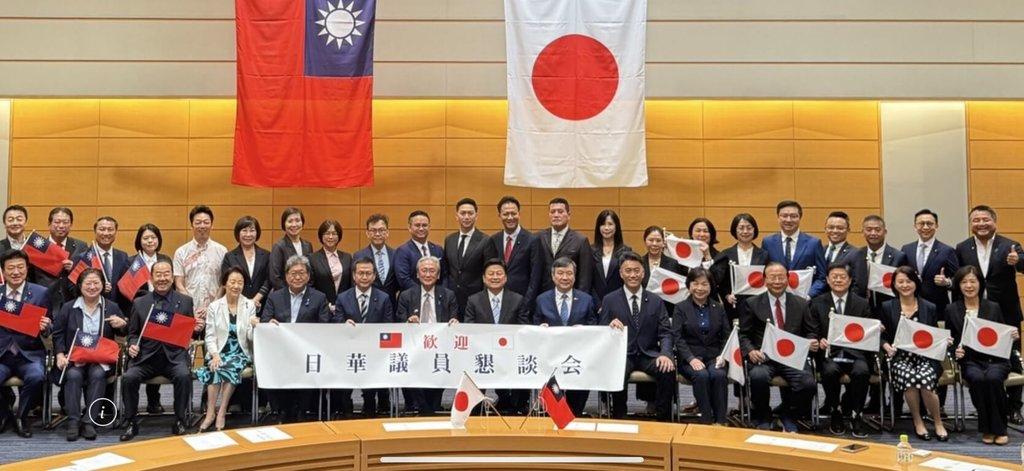A 27-strong delegation of the Chinese Nationalist Party (KMT) led by caucus whip Fu Kun-chi (傅崐萁) this morning met with 20 members of the Japan-ROC Diet Members' Consultative Council, including chairman Keiji Furuya and secretary-general Koichi Hagiuda at the First Members’ Office Building of the House of Representatives of Japan in Tokyo.
This was the largest delegation in Taiwan-Japan parliamentary history, and was arranged in complete secrecy within just one week, Fu said.
Ahead of the Legislative Yuan’s fourth session of its 11th term, the opposition party delegation arrived in Japan on Tuesday.

Photo courtesy of KMT caucus whip Fu Kun-chi's office
The two nations need to maintain close cooperation and enhance competitiveness in light of US President Donald Trump’s reciprocal tariffs, the US trade war and adjustments to semiconductor policies, Fu said.
Caucus secretary-general Lo Chih-chiang (羅智強), deputy secretary-general Lin Pei-hsiang (林沛祥) and representative to Japan Lee Yi-yang (李逸洋) were also in attendance.
The delegation was invited by the Japan-ROC Diet Members' Consultative Council to discuss Taiwan’s ascension to the Comprehensive and Progressive Agreement for Trans-Pacific Partnership (CPTPP), a Free Trade Agreement (TFA), which Japan plays a key role in following the US’ withdrawal under Trump in 2017, Fu’s office said in a news release.
The meetings would also discuss disaster prevention and mutual aid, while establishing deeper economic and trade relations, it added.
Fu thanked the council for its longstanding support for Taiwan, as Japan and Taiwan work closely in fields such as economics, culture, academia, tourism and industrial technology, he said, with frequent official and private bilateral communication.
Last year, Taiwan Semiconductor Manufacturing Co (TSMC, 台積電) opened its first chip manufacturing fab in Kumamoto, Japan, contributing significantly to talent cultivation and local development in Japan, he added.
Taiwan and Japan are also natural leaders in shaping Asia’s new AI landscape, he said.
KMT Legislator Lee Yen-hsiu (李彥秀), who is part of the trip, wrote in a Facebook post that the visit to Japan's Diet reflects the party's long-term goal of fostering friendly exchanges with Japan.
The KMT hopes such exchanges between the two legislatures can become routine to help strengthen cooperation on security, supply chain resilience and people-to-people ties, Lee said.
Furuya, a veteran member of Japan's ruling Liberal Democratic Party (LDP), was quoted in Fu’s statement as saying that he hopes that Taiwan and Japan would deepen bilateral relations, develop their democracies and ensure peace in the Taiwan Strait, as regional safety and stability are crucial to the Taiwanese people and Japanese residents in Taiwan.
Furuya said he looked forward to welcoming Legislative Speaker Han Kuo-yu (韓國瑜), a senior KMT member, during Han's upcoming trip to Japan later this month.
A source told CNA that Han is scheduled to lead a cross-party legislative delegation to Japan from Sept. 25-29 to promote parliamentary diplomacy. The group is also expected to visit Expo 2025 in Osaka, the source said.
Additional reporting by Liu Wan-ling

Three batches of banana sauce imported from the Philippines were intercepted at the border after they were found to contain the banned industrial dye Orange G, the Food and Drug Administration (FDA) said yesterday. From today through Sept. 2 next year, all seasoning sauces from the Philippines are to be subject to the FDA’s strictest border inspection, meaning 100 percent testing for illegal dyes before entry is allowed, it said in a statement. Orange G is an industrial coloring agent that is not permitted for food use in Taiwan or internationally, said Cheng Wei-chih (鄭維智), head of the FDA’s Northern Center for

LOOKING NORTH: The base would enhance the military’s awareness of activities in the Bashi Channel, which China Coast Guard ships have been frequenting, an expert said The Philippine Navy on Thursday last week inaugurated a forward operating base in the country’s northern most province of Batanes, which at 185km from Taiwan would be strategically important in a military conflict in the Taiwan Strait. The Philippine Daily Inquirer quoted Northern Luzon Command Commander Lieutenant General Fernyl Buca as saying that the base in Mahatao would bolster the country’s northern defenses and response capabilities. The base is also a response to the “irregular presence this month of armed” of China Coast Guard vessels frequenting the Bashi Channel in the Luzon Strait just south of Taiwan, the paper reported, citing a

A total lunar eclipse, an astronomical event often referred to as a “blood moon,” would be visible to sky watchers in Taiwan starting just before midnight on Sunday night, the Taipei Astronomical Museum said. The phenomenon is also called “blood moon” due to the reddish-orange hue it takes on as the Earth passes directly between the sun and the moon, completely blocking direct sunlight from reaching the lunar surface. The only light is refracted by the Earth’s atmosphere, and its red wavelengths are bent toward the moon, illuminating it in a dramatic crimson light. Describing the event as the most important astronomical phenomenon

UNDER PRESSURE: The report cited numerous events that have happened this year to show increased coercion from China, such as military drills and legal threats The Chinese Communist Party (CCP) aims to reinforce its “one China” principle and the idea that Taiwan belongs to the People’s Republic of China by hosting celebratory events this year for the 80th anniversary of the end of World War II, the “retrocession” of Taiwan and the establishment of the UN, the Mainland Affairs Council (MAC) said in its latest report to the Legislative Yuan. Taking advantage of the significant anniversaries, Chinese officials are attempting to assert China’s sovereignty over Taiwan through interviews with international news media and cross-strait exchange events, the report said. Beijing intends to reinforce its “one China” principle